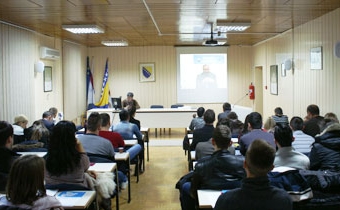Military analyst with the ICTY Office of the Prosecutor (OTP), Allen Borrelli, today held a video-link lecture for a group of students of the Sarajevo Faculty for Criminal Justice, Criminology and Security Studies. The video presentation on the “Role of Yugoslav People’s Army (JNA) in the war in Bosnia and Herzegovina” was attended by over 30 undergraduate and postgraduate students.
The students were particularly keen to learn about the methodology used by the OTP in the analysis of numerous military documents collected in the course of investigations, and the prioritisation of some documents over others. To illustrate the abundance of available documents used in court proceedings, the lecturer gave the example of over 200.000 different documents seized from the archives of the Drina Corps of the Bosnian Serb Army (VRS) which were used in a number of trials before the ICTY. Borrelli pointed out that military documents are very valuable due to their high credibility, and are given great importance in the work of the OTP and in court proceedings.
During the presentation, Sarajevo students learned a lot of new information. They were particularly surprised to hear that, in accordance with the Tribunal’s Rules, the prosecution must disclose to the defence any material that may suggest the innocence or may mitigate the guilt of the accused or affect the credibility of prosecution evidence.
Thanking the ICTY Outreach programme for organising another lecture for the students of her Faculty, Professor Edina Bećirević pointed out: “Students show great interest in the work of the Tribunal, particularly for military related issues. The practical experiences gained through the work of the Tribunal’s military experts are complementary to the theoretical knowledge acquired during the studies.”


